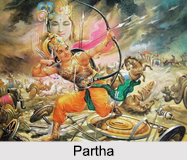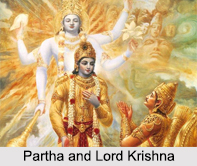 Partha or Arjuna is one of the central characters of the ancient Indian epic Mahabharata and plays a key role in the Bhagavad Gita next to Lord Krishna. Partha is the name of Arjuna, and he was the son of Pritha. Arjuna was such a superior archer that he is often referred as "Jishnu" - the undefeatable. The third of the five Pandava brothers, Partha or Arjuna was one of the children born to Kunti, the first wife of Pandu. He is sometimes referred to as the `fourth Krishna` of the Mahabharata.
Partha or Arjuna is one of the central characters of the ancient Indian epic Mahabharata and plays a key role in the Bhagavad Gita next to Lord Krishna. Partha is the name of Arjuna, and he was the son of Pritha. Arjuna was such a superior archer that he is often referred as "Jishnu" - the undefeatable. The third of the five Pandava brothers, Partha or Arjuna was one of the children born to Kunti, the first wife of Pandu. He is sometimes referred to as the `fourth Krishna` of the Mahabharata.
Etymology of Partha
Partha means the "son of Pritha". Pritha is an additional name for queen Kunti who was Arjuna"s mother. The name Arjuna means bright, shining, white or silver. Arjuna in Sanskrit means having the complexion of the Arjun Tree which is of the colour of milk and that it is devoid of any stain.
Legends of Partha
Arjuna was born into the royal family of Hastinapura. He is known as a son of King Pandu by his first wife queen Kunti. He was the third son, after Yudhishthira and Bhima. He had two younger brothers, the twin sons born to Pandu"s second wife Madri, Nakula and Sahadeva. He was married to Draupadi, Ulupi, Chitrangada and Subhadra at different times. His children included Srutakarma, Iravan, Babruvahana, and Abhimanyu. Arjuna was considered to be the 10th best archer after Lord Krishna, Karna, Eklavya, Bhishma, Dronacharya, Ashwatthama, Abhimanyu, Bhagadatta and Bhima.
Arjuna was considered to be the 10th best archer after Lord Krishna, Karna, Eklavya, Bhishma, Dronacharya, Ashwatthama, Abhimanyu, Bhagadatta and Bhima.
In the whole text of Mahabharat, Arjuna is called by many names. Among one of the many qualities of Arjuna, his dearness to Lord Krishna was the most major one. Lord Krishna referred to him as Arjuna if he were to choose someone from the Pandavas. He is also called as "Purusharshva", which means the supreme among men. He had to face the extreme challenges at every step of his life where he had to surrender almost everything and yet come out winner. Partha or Arjuna has been addressed the celestial song of Bhagavada Gita. His father was Lord Indra, the king of Gods. He gained the personal assistance of Lord Krishna in the war of Mahabharata. Lord Krishna acted as his charioteer and before the battle, instructed him regarding the spiritual philosophy of Bhagavad Gita.
At a very young age Partha got praise for his earnestness and skill in archery. During the exile for twelve years as a part of their agreement with the Kauravas, Arjuna had a strange encounter with Lord Shiva from whom he got "Pasupatha". During the same period he met with Lord Indra and other Gods from whom he received training. While he was in the heaven he displeased Urvashi, the divine fairy, by turning away her advances. She cursed him out of anger to turn into a eunuch for a year in his life as chosen by him. He took help of the curse he got from Urvashi and turned himself into "Brihannala", a eunuch and acted as dance master for the royal household, particularly Uttara, the daughter of Virat. He helped king Virat by fighting a battle with Kauravas who attacked his empire.
Partha had the luck of receiving the celestial knowledge of the Bhagavad Gita by asset of his internal purity and his faithfulness to Lord Krishna. Partha symbolizes clarity, honesty, loyalty and bravery. After the clash of Mahabharata, he assisted his brother very much in increasing their empire by seizing some outlying kingdoms and defeating military tribes. After the passing away of Lord Krishna, he forgot most of his skills as an archer and spent the rest of his life in modesty and loyalty.
Death of Partha
Pandavas appointed Parikshit (son of Abhimanyu and Virat`s daughter, Uttara) as descendant of King`s throne and retires to forest and travels towards heaven. On the way, one by one falls dead according to their character. After Draupadi, Sahadev and Nakul, Arjuna falls dead as he was more self-righteous over his archery skills and had pride that he was the most powerful warrior in the world.












